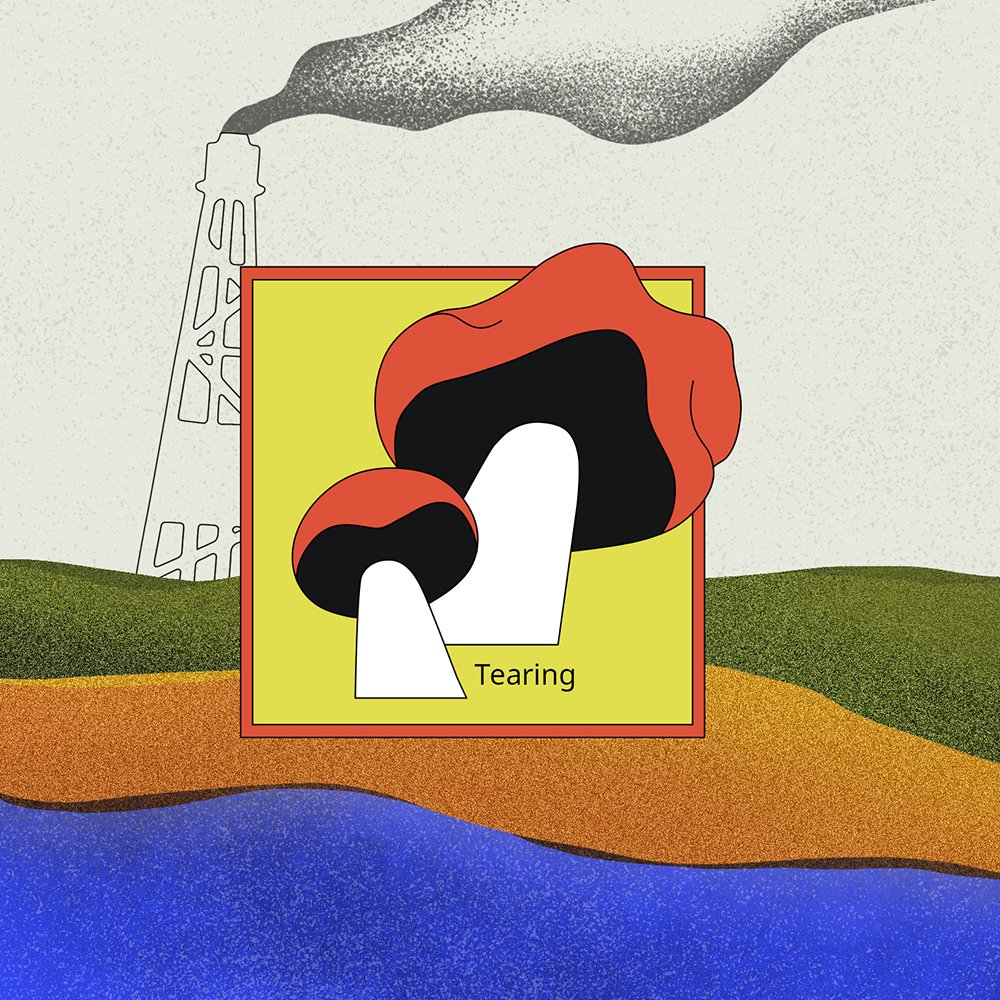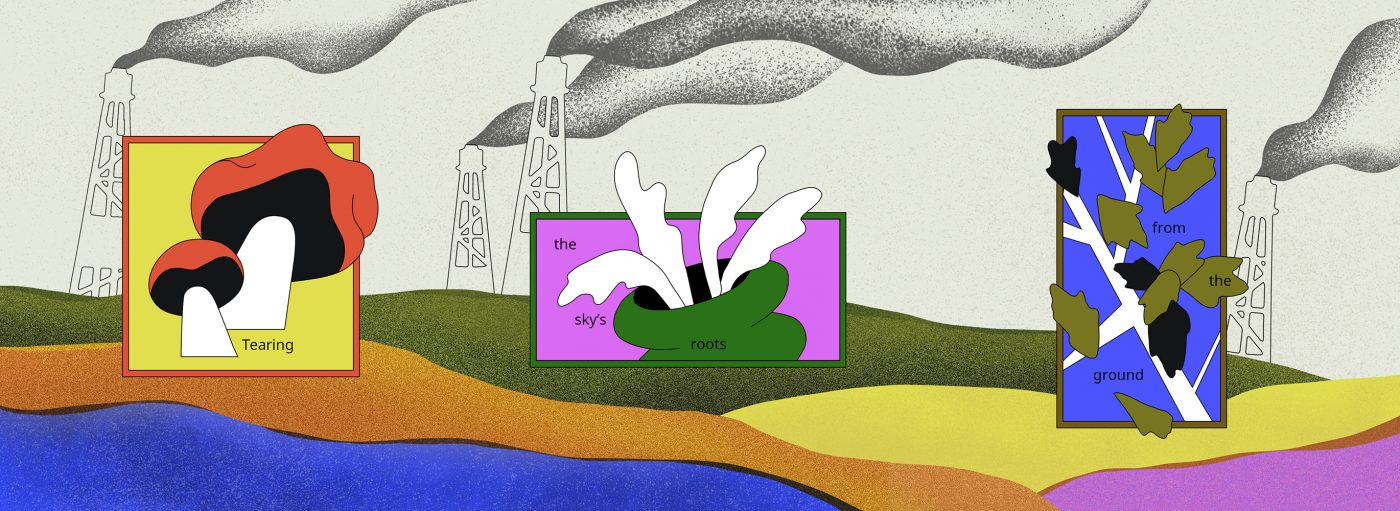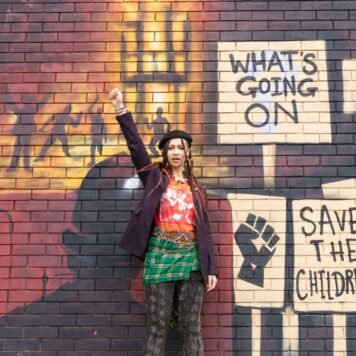On another freakishly hot summer’s day in London I visited the ‘Rooted Beings’ exhibition on plants and fungi at The Wellcome Collection – a gallery in Euston owned by the Wellcome Trust. But beneath the glorious fractal designs and art stitched onto natural fabrics, hides a dirty and dangerous secret.
A dirty secret
The Wellcome Trust is a charitable foundation that funds research, including how climate change affects human health. This is done using an investment portfolio of around £38 billion, which is partially sustained by investments in the single biggest cause of climate change that’s in fact attacking human and societal health – fossil fuels.
In the most recently reported year of Wellcome Trust investments, huge London-based global polluters Royal Dutch Shell and BP were listed as being among the top 40 corporations they have direct public equity holdings in. Both are social pariahs, regularly protested by young people across London due to their relentless expansion of the oil and gas industry, making our only home uninhabitable.
Sheltered from the beating heat outside, I picked through the beautiful exhibit, and the confusing interplay between its critical coverage of colonialism in, for example, expeditions for scientifically useful plants and the colonial extractivism that its owners perpetuate.
Along one wall shadowy shapes were just visible beneath layers of what appeared to be chiffon. But, when I touched it, it was plastic. Much like the Wellcome Trust’s investments, underneath an attractive cover, oil is bubbling.
Tearing out the sky’s roots from the ground
Temporarily displayed is a sobering reflection from a shaman and spokesperson for the Yanomami people in Brazil, Davi Kopenawa, which reads: “I want to warn the white people before they wind up tearing the sky’s roots out of the ground.”
But is this warning being heard by Wellcome itself? Whose voice can trickle down through the earth, to feed the deep system change that is needed? How do we make the fight for life seem appropriate everywhere? How can we ensure that this universal shout for the survival of our natural systems resonates and is acted on?
Though the exhibition appears thoughtful, spiritual and fiercely political, the truth lurks just out of sight, sold out for the forces that really shape our world: ‘respectability’, habit and money.
Rob Abrams, a campaigner for social justice medical action group Medact, has campaigned against the Wellcome Trust’s collection with both Medact and the group I’m now part of – Fossil Free London – which protests the fossil fuel industry and its funders in our city.
He previously was closely involved in a Guardian campaign to push Wellcome to divest. But “when the trust was given an opportunity to talk and take action they pulled the shutters down. There was no negotiation whatsoever,” Rob explains. “They responded instead by increasing their investment in fossil fuels. It was the most petty thing ever.”
Time for the woke to wake up
Rob has no time for this exhibit’s apparent political savviness. “Wellcome Collection’s woke-washing is 100% PR bullshit. I’m super cynical about it.” He goes on to tell me that all their “woke” programming and messaging began shortly before the death of George Flloyd, when instead of committing to genuine reparative justice, like returning Indigenous looted items from their collection, they released no more than a statement.
Jess Worth is a campaigner with Culture Unstained, an organisation which works to challenge fossil fuel sponsorship of the cultural sector. They’ve had 15 wins in the last 10 years and she tells me: “It’s really only the Wellcome Collection, the British Museum and the Science Museum left.” Other institutions have backed down from fossil fuel sponsorship, understanding it is too damaging for their reputation, and for their relationships with young people in particular.
“It just looks like hypocrisy when they’re doing all this programming on climate change and have made strong statements about the need for decarbonisation, and yet in the Wellcome’s top 40 investments you’ve got BP and Shell, two of the biggest fossil fuel companies in the world,” she asserts.
High stakes endangerment
And it’s not only hypocrisy either. “We’re at this very dangerous tipping point,” says Jess. “There was a great quote by Security General of the UN Antonio Guterres – ‘[fossil fuel corporations have] got the world by the throat and we’re all being held hostage by their power and their lack of movement’.”
So why do the Wellcome Trust insist on continuing to use money from the fossil fuel industry? Do they buy the oil executives’ hype?
The fossil fuel industry is currently investing heavily in advertising to give the appearance of transitioning their portfolios from oil and gas, when actually they are often expanding production in the short term.
Delay is the new denial
Whereas previously oil and gas corporations spread misinformation about climate change through shady think tanks and funding disreputable ‘scientists’ to mislead the public, now they strive to create the impression they are doing what’s needed while de facto doing the opposite.
We already need to leave much of the existing reserves of coal, oil and gas in the ground to avoid the catastrophic collapse of our life support systems. But Shell and BP are doing the opposite and building new projects – including the Jackdaw gas field by Shell, in the North Sea, and a massive new gas project in Indonesia that’s going to run for 30 years for BP.
“The Wellcome Trust is playing a very high stakes game,” Jess says. “We don’t have time to wait for the oil industry to engage. It’s continuing to push out greenhouse gases and build new infrastructure now that’s locking us into climate disaster for decades to come.”
This scientific body dedicated to global research that helps public health should surely know that.
Subscribe to shado's weekly newsletter
Exclusive event news, job and creative opportunities, first access to tickets and – just in case you missed them – our picks of the week, from inside shado and out.

A shock win
On the hottest day ever in UK recorded history, the Wellcome Trust replied to our request for comment with the following surprise news: “We sold our holdings in BP and Shell earlier this year following strong share price performance as part of a shift in our approach to public equities ownership aimed at concentrating our portfolio more heavily into companies in non-cyclical sectors. This will be reflected in the directly held public equities table on our website when we next update it at the time of our annual report.”
The dropping of BP and Shell from their investments is great to witness, and a welcome step along the road to divestment, but what we need now is something solid. Withdrawing from BP and Shell should only be the first move. As Medact released in a public statement on their Twitter: “To show true leadership on the climate crisis, Wellcome must commit to FULL divestment. It is morally unjustifiable for such a big and influential health institution to be profiting from ecological destruction.”
Rianna from Friends of the Earth commented: “The Wellcome Trust has been under pressure for years to withdraw investment from the fossil fuel industry … it has instead pedalled the greenwash of big oil and gas firms who continue to apply for new development licences here in the UK and around the globe. For a leading scientific institution that knows well enough the massive health impacts associated with runaway climate breakdown, it’s not good enough. For the good of public and planetary health, it must commit fully to divest from fossil fuels as thousands of organisations around the world have already done.”
The climate crisis is too pressing to tinker around the edges, knocking off one climate-wrecking company here, another there, dependent on the fluctuations of a financial market that is dealing in death: and hurtling us all down a steep road of global decline.
For the investment the Wellcome Trust is making into climate groups, climate research and the Collection’s ecological exhibitions to mean anything they obviously should not be committing to never make the crisis worse again.
What can you do?
Fight fossil fuels: If you want to join the struggle to get fossil fuels out of our lives and imagine a better future for people here in London, and affected by the city’s activities worldwide, become an organiser with Fossil Free London and help us protest the fossil fuel industry. Sign up to a welcome call on our website or message us on Instagram.
Join the fight to push the Science Museum to drop their oily sponsors
- Find more about it here
- And join one of the new coalition of campaigns working to get Equinor, Adani and Shell out of the Museum
- If you’re an educator sign the educator’s boycott, or help spread the word if not
Learn about fossil fuel corporations: You only need to understand that the fossil fuel industry both caused climate change and refuse to change to join Fossil Free London to oppose them. Learn as you go! But if you want to dive in…
- Listen to the Drilled podcast by Amy Westervelt Drilled on Apple Podcasts
- Read Revealed: the ‘carbon bombs’ set to trigger catastrophic climate breakdown
Understand colonialism: To find out more about the colonial history of exhibited objects and the ongoing colonialism of their oily sponsors
- Check out campaigning group BP or Not BP’s website and one of their Stolen Goods tour: British Museum hit by unofficial “Stolen Goods” tour covered in this article
- If you want to learn more about UK colonialism generally read Akala’s Natives
- check out Stories of our times: Empireland: How imperialism shaped modern Britain

Wellcome Trust directly held Public Equity Holdings at September 2021













